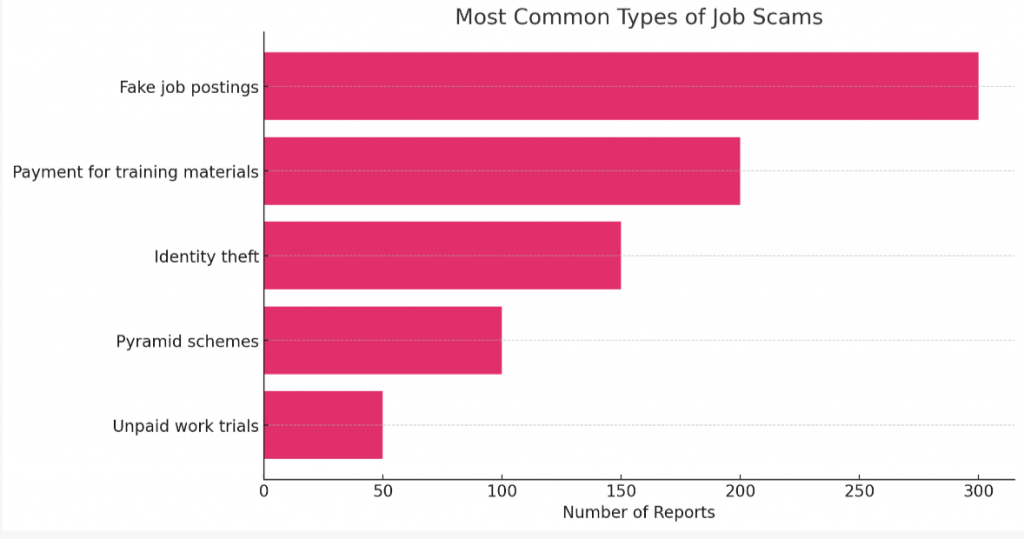Identifying and Avoiding Scams in Remote Social Media Job Hunting
Navigating the remote job market can feel like walking through a minefield of scams, especially when you’re on the hunt for social media work. In fact, Americans lose around $2 billion annually due to these tricky employment scams.
This blog post is here to guide you safely through, detailing key signs of scammy job listings and explaining how you can protect yourself from cybercriminals. Ready? Let’s start your safe journey into remote work!
Key Takeaways
- Scammers in remote social media work often use fake URLs, photos, and company names to deceive job seekers.
- Communication through unverified platforms like instant messaging services can increase the risk of falling for a job scam.
- Job hunters should be cautious of vague job listings with high income promises and unsolicited job offers.
- It’s important to be wary of scammers who create a sense of urgency for applying to remote social media jobs without proper verification.
- Common scams in remote social media work include phishing scams, data entry scams, pyramid marketing schemes, paying for remote work equipment, and online reshipping/rebate processor scams.
- To protect yourself from job scams, practice safe job searching practices, verify the company’s online presence, check for reviews, avoid monetary transactions upfront, and trust your instincts.
Recognizing Scams in Remote Social Media Work
Scammers often use fake URLs, photos, and company names to deceive job seekers in remote social media work.
Fake URLs, Photos, and Company Names
Scammers often trick job seekers into applying for bogus roles using fake URLs, photos, and even company names. They expertly forge websites that look strikingly similar to legitimate ones.
Cybercriminals may use a well-known brand’s name in the URL but alter one letter or add extra characters, leading job hunters to believe they’re on the real site. The same tactic applies to photos of supposed team members or offices which are usually stolen from genuine sources.
Even more deceiving is their choice of company names; many fraudsters assume the identities of high-profile companies like Google or Apple to post fictitious jobs. Always be vigilant — double-check URLs for slight misspellings and do a reverse image search for pictures you suspect might be fraudulent.
Communication Through Unverified Platforms
Job scammers often use unverified platforms for communication, escalating the risk of falling prey to job search scams. These cybercriminals might encourage potential victims to communicate through non-standard business channels such as instant messaging services, including Telegram and WhatsApp.
This strategy helps them steer clear of company emails that can be traced back or verified.
Scammers usually avoid legitimate email domains and direct phone calls, opting instead for these chat-based platforms. On these platforms, they’re free from many anti-fraud regulations, making it easier for them to request personal financial information or other sensitive data from unsuspecting job seekers.
The lack of verifiable information on such platforms also complicates the process of identifying job scams.
Vague Job Listings with High Income Promises
Scammers frequently post vague job listings promising high income to grab the attention of eager job seekers. They exploit the vulnerability of individuals desperate for a solid paycheck, leveraging their hopes and financial fears.
These ambiguous listings may lack a clear company name or any specific role requirements but boast extravagant pay rates that are too intriguing to ignore. Scammers use these tactics in an attempt to lure unsuspecting people into providing personal information or even making upfront payments for non-existent opportunities.
Always remain cautious and conduct thorough research before engaging with such postings, verifying direct contacts with the company whenever possible. Such vigilance can protect you from falling victim to fraudulent schemes amidst increasing fraud threats anticipated in 2023’s remote job market.
Unsolicited Job Offers
Unsolicited job offers occur when a company or individual extends an invitation for employment without prior interaction or request from the job seeker. Be wary of these offers, as scammers often use this tactic to trap desperate individuals seeking work.
They create the illusion of a unique opportunity handed over on a silver platter and rush the victim into making hasty decisions without proper verification. These faux job proposals usually come with extremely attractive terms such as high pay for minimal effort, flexible hours, or promising career paths that can be very tempting but are too good to be true.
The underlying trick is phishing – getting personal information under false pretenses which leads to identity theft and other fraudulent activities. Hence, it’s essential to exercise extreme caution before responding to any unsolicited job offer, whether via email, social media messages or calls even if they appear valid at first glance.
It is much safer and smarter not only focusing on apparent windfall but also conducting independent research about the offering party directly in order not enter their snare unknowingly.
Urgency to Apply
Scammers prey on job seekers by exploiting their sense of urgency to apply for remote social media work. They know that many people are in desperate need of a job and will jump at any opportunity, even if it seems too good to be true.
By creating a false sense of scarcity or time-sensitive offers, scammers manipulate job seekers into making hasty decisions without conducting proper research or verifying the legitimacy of the company.
It’s crucial for job seekers to remain cautious and take the time to thoroughly investigate any remote social media work opportunity before proceeding further.
Common Scams in Remote Social Media Jobs
Some common scams in remote social media jobs include phishing scams, data entry scams, and pyramid marketing schemes.

Phishing Scams
Phishing scams are a common type of job hunting scam in the remote social media work field. These scams involve cybercriminals posing as legitimate employers to trick job seekers into providing personal and financial information.
They typically use deceptive tactics such as fake job ads, emails, or social media messages that appear authentic. The scammers often create a sense of urgency, pressuring victims to act quickly without thoroughly verifying the legitimacy of the opportunity.
It’s important for job seekers to be cautious and skeptical when sharing sensitive information online, especially in response to unsolicited offers or suspicious requests.
Data Entry Scams
Data entry scams are a common type of job scam that targets remote social media workers and job seekers. In these scams, scammers pose as legitimate companies offering data entry jobs, but their intentions are to deceive and exploit unsuspecting individuals.
These scammers create fake websites, emails, and social media accounts using stolen information to appear authentic. They often ask for personal financial information early in the application process, which should always be seen as a red flag.
To protect yourself from falling victim to data entry scams or any other job scam, it’s important to verify the legitimacy of the company by conducting your own research and contacting them directly.
Pyramid Marketing
Pyramid marketing is a common scam found in remote social media jobs. Scammers who use pyramid marketing schemes entice job seekers with promises of high returns and fast profits. However, these scams often require individuals to invest money upfront or recruit others to join the scheme.
Unlike legitimate businesses, pyramid marketing scams focus on recruiting new members rather than selling actual products or services. It’s important to note that pyramid marketing scams are illegal in many countries.
Social media platforms such as Facebook, LinkedIn, and Twitter are frequently used by scammers to promote these fraudulent schemes.
Paying for Remote Work Equipment
Scammers often target job seekers by asking them to pay for remote work equipment as part of their scam. It is important for job seekers to be cautious and skeptical of any requests for upfront payment for equipment.
To protect themselves, job seekers should do their own research and verify information before making any payments. Being proactive and taking the time to thoroughly investigate can help prevent falling victim to these scams.
Online Reshipping and Rebate Processor Scams
Online reshipping and rebate processor scams are prevalent in the realm of remote social media jobs. Scammers specifically target job seekers looking for flexible work opportunities, enticing them with false promises and high income potentials.
These fraudsters pose as potential employers and reach out to individuals through various mediums such as email, social media messages, or online job boards.
In these types of scams, job seekers may be asked to engage in reshipping or rebate processing activities on behalf of the scammers. However, unbeknownst to the victims, these tasks often serve as a cover for illegal activities like money laundering or receiving stolen goods.
Scammers may even go as far as requesting personal information such as driver’s license numbers, Social Security Numbers, and bank account details under the guise of completing employment paperwork.
How to Protect Yourself from Job Scams
Protect yourself from job scams by practicing safe job searching, verifying the company’s online presence, checking for company reviews, avoiding monetary transactions, and trusting your instincts.
Safe Job Searching Practices
- Use reputable job search websites and platforms.
- Research and verify the legitimacy of the company before applying.
- Be cautious of job listings with vague details or high income promises.
- Avoid sharing personal financial information during the initial stages of the application process.
- Trust your instincts and avoid job offers that seem too good to be true.
- Be wary of unsolicited job offers or communication from unknown sources.
- Take your time to thoroughly read and understand the job description before applying.
- Look for grammatical or spelling errors in job postings, as scammers often make mistakes.
- Use caution when providing your Social Security number, driver’s license, or other sensitive information.
- Be cautious of job postings that require upfront payment or fees.
- Report any suspicious job listings or experiences to relevant authorities.
Verifying the Company’s Online Presence
To protect yourself from job scams, it is crucial to verify the company’s online presence before proceeding with any job application. Start by researching the company’s website and checking if their URL matches the official domain.
Be cautious of fake websites that closely resemble legitimate ones. Additionally, look for verifiable information such as contact details, a physical address, and an official email domain.
You can also search for the company on social media platforms to see how active they are and if there is engagement from real employees or customers. By taking these steps, you can ensure that you are dealing with a reputable company and avoid falling victim to job scams.
Checking for Company Reviews
Checking for company reviews is an essential step to protect yourself from job scams. It provides valuable insights into the reputation and legitimacy of a potential employer. Before applying, take the time to research and read reviews about the company from reliable sources like FlexJobs or the Better Business Bureau (BBB) scam tracker.
These platforms can help you gauge whether others have had positive experiences with the company or if there are any red flags to be aware of. Remember, scammers often try to create fake personas and websites, so verifying information through trustworthy channels is crucial in making informed decisions about remote social media jobs.
Avoid Monetary Transactions
To protect yourself from job hunting scams in remote social media work, it’s crucial to avoid monetary transactions until you have confirmed the legitimacy of a job and company. Scammers often manipulate web addresses and create fake company websites to trick unsuspecting job seekers into making financial transactions.
By conducting thorough research on the company and directly contacting them for verification, you can safeguard your personal finances from potential scams. It’s important to remember that job seekers should never provide any banking or credit card information before thoroughly vetting the opportunity.
With reported job scams tripling between 2020 and 2021, taking precautions when it comes to monetary transactions is essential in avoiding becoming a victim of fraudulent activity.
Trusting Your Instincts
Job seekers should always trust their instincts when it comes to protecting themselves from job scams. Scammers are skilled at using persuasive tactics to lure victims, so it’s essential to listen to that gut feeling if something doesn’t seem right.
Research shows that scammers often target individuals who are desperate for employment, taking advantage of their vulnerability and need for financial stability. By trusting your instincts and being cautious throughout the job search process, you can better protect yourself from falling victim to these fraudulent schemes.
Responding to Job Scams
Report the scam immediately to the appropriate authorities and provide any relevant information or evidence you have gathered. Additionally, take steps to protect yourself by monitoring your financial accounts for any suspicious activity and consider alerting credit bureaus to potential identity theft.
Reporting the Scam
If you encounter a job hunting scam in remote social media work, it’s important to take action. Here are steps to report the scam:
- Contact the Federal Trade Commission (FTC) and provide them with all relevant information about the scam.
- File a complaint with the Better Business Bureau (BBB) Scam Tracker to help warn others about the scam.
- If the scam involved an online platform or website, report it to the platform’s administrators or customer support.
- If you received fraudulent emails or communication, forward them to the Anti – Phishing Working Group at reportphishing@apwg.org.
- If you were asked to make any financial transactions or share personal information, contact your bank or credit card company immediately.
- Consider reporting the scam to local law enforcement authorities as well.
How to Recover if Victimized
If you have fallen victim to a job scam, here are the steps you can take to recover and protect yourself:
- Contact your financial institution immediately to report any unauthorized transactions and freeze your accounts.
- File a complaint with the Federal Trade Commission (FTC) through their Scam Tracker website or by calling their toll-free hotline.
- Report the scam to the Better Business Bureau (BBB) using their online scam reporting tool.
- Monitor your credit reports for any suspicious activity and consider placing a fraud alert or credit freeze on your accounts.
- Change all passwords associated with the scam, including social media, email, and banking accounts.
- Inform local law enforcement about the scam and provide them with any evidence or information you have.
- Stay vigilant for any further attempts at fraud or identity theft and report any suspicious activity promptly.
- Seek support from friends, family, or professionals to help cope with the emotional stress caused by the scam.
Conclusion
Protecting yourself from job hunting scams in remote social media work is crucial to avoid falling victim to cybercriminals. By recognizing common signs of scams, verifying company information, and trusting your instincts, you can navigate the remote job market safely and securely.
Stay proactive in safeguarding your personal and financial information, report any suspicious activity, and continue to educate yourself about job scam prevention. With these steps in place, you can have a scam-free job search experience and find legitimate remote work opportunities that align with your skills and goals.

